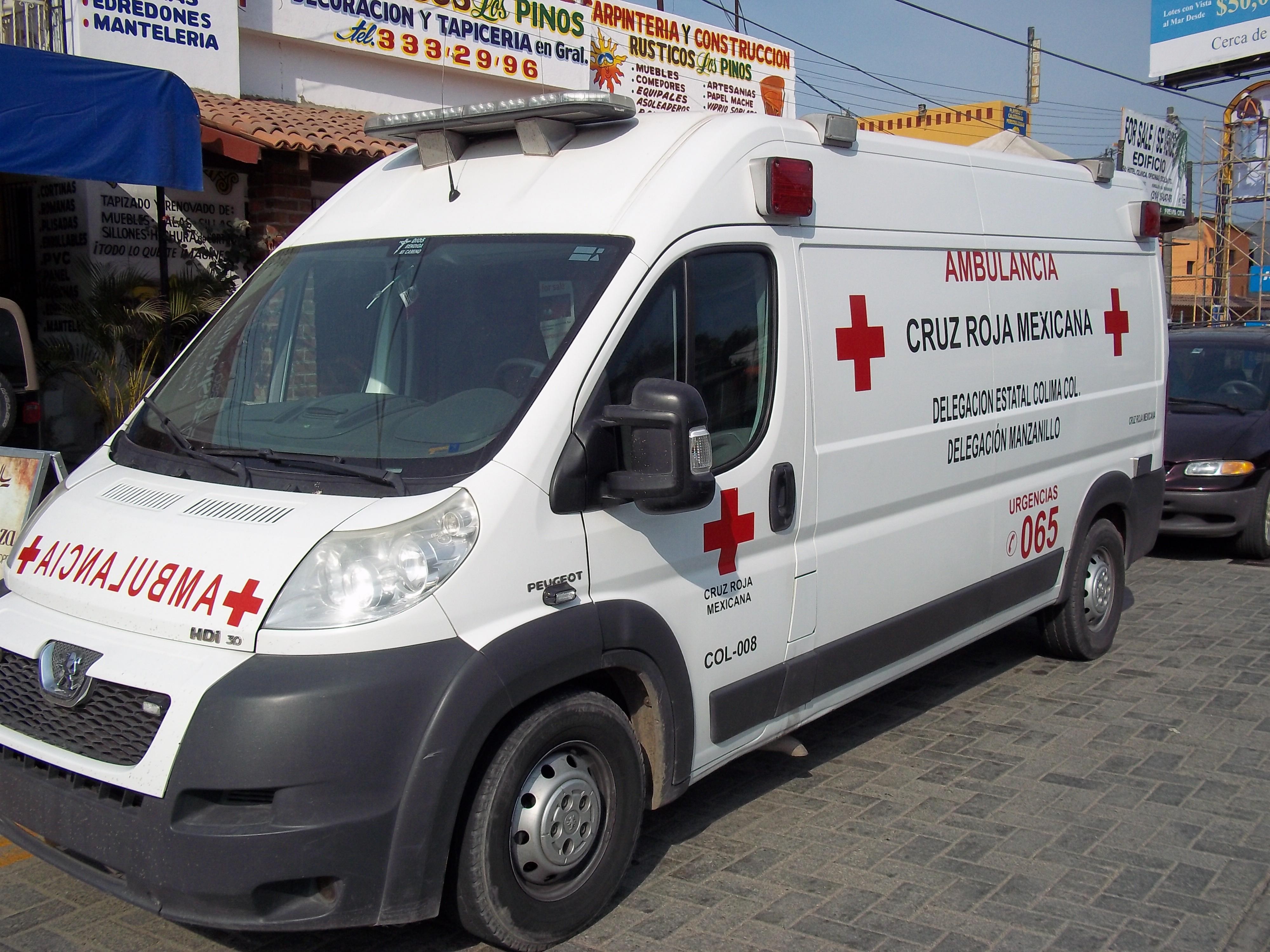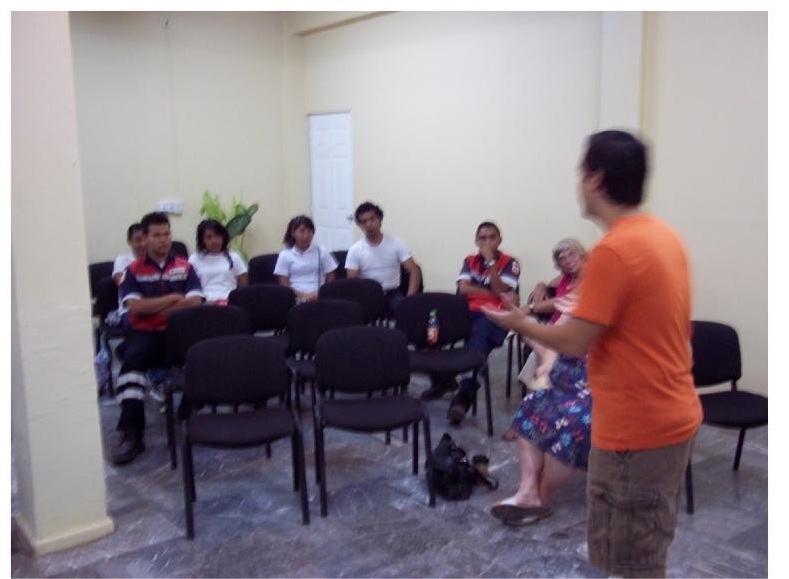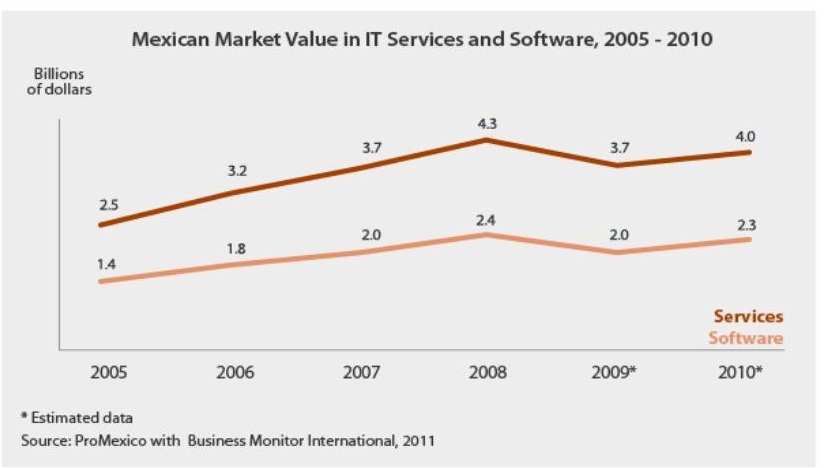By Robert Hill from the May 2012 Edition

A few months ago Reyna Garcia was appointed by the Governor and Mayor as the new Director of Cruz Roja (Red Cross) for Manzanillo. We all know her as the friendly waitress at Juanito´s restaurant where she has worked for the past 30 years for her sister and brother-in-law, Esperanza and John Corey. Reyna is hoping that everyone in the foreign community will be aware of some important changes she is making to improve the services of Cruz Roja.
In the U.S. or in Canada we take ambulance service for granted, as it is provided for with taxes paid for local police and fire department services. This is not the case in Mexico, where ambulance service is the exclusive responsibility of Cruz Roja, through independent organizations in each city. A common misconception is that because the Red Cross has a lot of money at its disposal in the U.S. and Canada, the same must be true in Mexico. This is definitely not the case. In fact, the Manzanillo Cruz Roja receives only about 40% of its operating budget from federal, state and local governments, including proceeds from the national fundraising program held each April. The remaining 60% must be obtained from individual and business donations.
Since taking over, one of Reyna’s initiatives has been to improve ambulance services for the foreign population in Manzanillo, most of whom speak little Spanish. For example, if an “expat” is experiencing a heart attack at home, their spouse will usually dial one of the published emergency numbers, some of which are monitored 24 hours a day. With one exception, the person answering works for some law enforcement agency, and will normally relay the information to Cruz Roja, if they determine that an ambulance is needed. The single exception is the number for a direct line to Cruz Roja, 336-5770. The main problem with all of this of course, is language. If her husband is experiencing a heart attack, his wife will likely be frantic, not thinking clearly, and unable to remember what little Spanish she knew. The person on the other end of the line will be speaking rapid-fire Spanish, so she has no idea at all if they understand what she is saying.
ALL OF THIS IS ABOUT TO CHANGE…. Reyna has made it mandatory for all 30 of the Cruz Roja paramedics to attend English language classes so they can communicate with the foreign community in Manzanillo. These are the people who man the 24 hour telephone line, and who work as drivers and Emergency Medical Technicians in the ambulances. This group of dedicated men and women, who work for token wages, are also donating their time to attend English language classes every Saturday from 9 – 11 AM. The classes are held at the non-denominational Church Of Hope, located next door to Juanito´s. Pastor Lee Gonzales and his wife Patty are donating their time to teach the classes, along with some of the church members. They are starting with an emphasis on learning the words and phrases typical of an emergency medical situation. This means that very soon, an “expat” will be able to call the direct number to Cruz Roja and communicate in English, 7 days a week, 24 hours a day. The Cruz Roja paramedic will have the telephone in one hand and a 2-way radio in the other hand, dispatching an ambulance. Before the caller hangs up, an ambulance will be on the way with flashing red lights and siren.
THE FLIP SIDE OF THE COIN….is that Cruz Roja needs help from the foreign community. There is no shortage of opportunities for charitable giving in Manzanillo including the elderly, poor families, orphans, and spay/neuter programs for dogs and cats. However, Cruz Roja has a specific need that can and will save human lives, and Reyna is making an appeal to the foreign community to help meet that need. Every fire/rescue truck in the U.S. and Canada carries a piece of equipment called “The Jaws Of Life”, but not one of these tools exists in Manzanillo. When the paramedics respond to a traffic accident, a frequent problem is encountered by their not being able to open the doors of the vehicle, in order to provide emergency medical treatment and remove the victims. Many times the doors are jammed shut and the paramedics must resort to breaking out windows of the vehicle. Removing an injured person from a wrecked car in this manner can cause further injuries, and delay getting them to the hospital. There have been times when people have bled to death inside a wrecked car, simply because of the time lost in getting them out of the vehicle. The Jaws Of Life is a portable, hydraulic tool that can be used by paramedics to quickly pry open jammed doors, or to cut away and remove car body panels. Many times it is used to peel the roof off of a wrecked car, just like opening a can of sardines. In addition to vehicle accidents, The Jaws of Life would be an invaluable tool for rescue personnel after a strong earthquake, when buildings have collapsed, trapping people in the rubble.
In round numbers, one of these pieces of equipment has a cost of about US $20,000, or 200 people each contributing $100. Additionally, qualified personnel must be found who can instruct Manzanillo paramedics and firemen in how to use it.

Manzamigos A.C. is a private, non-profit association in Manzanillo comprised of members of the foreign community. They have agreed to establish a special fund specifically for the purpose of receiving donations to buy a Jaws of Life for Cruz Roja. Everyone wishing to make a donation to the Jaws of Life fund is encouraged to contact Manzamigos, either through their website ; www.manzamigos.com or by e-mail to their President, Freda Rumford, at: fredarumford@yahoo.com or manzamigos@gmail.com. They will be able to provide specific information as to how your tax deductible donation can be received.
Additionally, everyone is encouraged to forward this article to friends or relatives you may have in the U.S. or Canada, who have contacts with a fire department or association of fire/rescue personnel. It is possible that some group of active or retired fire/rescue units may wish to join forces with their counterparts here in Manzanillo, in order to make this project possible.
Download the full edition or view it online




You must be logged in to post a comment.